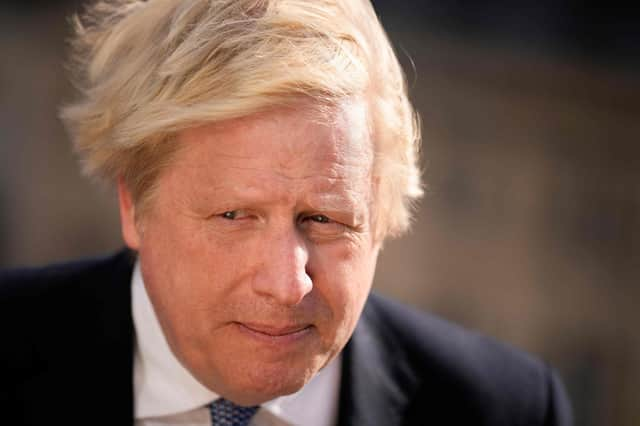Boris Johnson urges people not to throw caution to the wind as he prepares to end restrictions in England


The Prime Minister is expected to scrap the requirement to self-isolate when he lays out his vision for the future on Monday.
But Labour accused him of "declaring victory before the war is over" and insisted there are "glaring inconsistencies" in the UK government's approach.
Advertisement
Hide AdAdvertisement
Hide AdThe party also raised concerns about any move to end free lateral flow tests.
First Minister Nicola Sturgeon will outline her own framework for dealing with Covid in the future in Scotland on Tuesday.
SNP ministers previously said the Prime Minister's "ill thought-out" policy was an attempt to "deflect and distract" from the Downing Street parties scandal.
Speaking to the BBC's Sunday Morning show, Mr Johnson said: "I think it's very important we should remain careful, and we're certainly not asking people to throw caution to the wind.
"Covid remains a dangerous disease, particularly if you haven't been vaccinated, particularly if you're vulnerable."
He later added: "But we need people to be much more confident and get back to work."
The Prime Minister said there was "no case for complacency about this", but argued the UK has "reached a stage where we think you can shift the balance away from state mandation, away from banning certain courses of action, compelling certain courses of action".
He said: "We need resilience, but we don't need to keep - for instance on testing, we don't need to keep spending at a rate of £2 billion a month, which is what we were doing in January."
Advertisement
Hide AdAdvertisement
Hide AdMr Johnson continued: "I'm not saying that we should throw caution to the wind, but now is the moment for everybody to get their confidence back."
However, he did not rule out a return to restrictions in the future, saying: "I'm afraid you've got to be humble in the face of nature."
Labour’s shadow secretary for health, Wes Streeting, told Sky News he was "particularly concerned about the end of free testing".
He said: “It is like being 2-1 up with 10 minutes left of play and subbing your best defender.
“We are not out of the woods yet on Covid and it is important that when the government publishes its plan for living with Covid tomorrow, that it is a robust plan that enables everyone to live well with Covid.”
Mr Streeting called on the UK government to publish its scientific advice, adding: "Because at the moment this seems very premature.
"It seems like Boris Johnson is keen to declare victory before the war is over, in the hope he gets some headlines about 'Victory Day on Covid', instead of 'Police officers asking questions about actions in No 10'."
He added: "I don't think it's right that we should effectively declare victory before the war is won and have a free-for-all where people don't know their status and aren't required to stay at home even if they do test positive. That's the wrong thing to do right now."
Advertisement
Hide AdAdvertisement
Hide AdMr Streeting said there are "glaring inconsistencies" in the UK government's approach.
He said: "It does seem to me that the whole decision-making process in No 10 at the moment is being driven by the Prime Minister's political weakness, not by public health, and that should concern all of us."
The move to end self-isolation requirements for positive Covid cases has been criticised by experts.
Dr Chaand Nagpaul, chair of the council of the British Medical Association, told BBC News: “I think the right time is when the first leap of faith is supported.
“You have at the moment more people dying, more people in the hospital, than you had before Plan B (restrictions) was introduced.
“It seems a rather odd decision to make. We need to see case rates fall down even more – remembering that people aren’t being restricted at the moment in any severe way at all – people are living normally.
“The second thing is we do need therefore to continue having surveillance, because you won’t know whether you’ve reached that point where the infection rates have come down enough until you’ve had that surveillance.”
Comments
Want to join the conversation? Please or to comment on this article.
